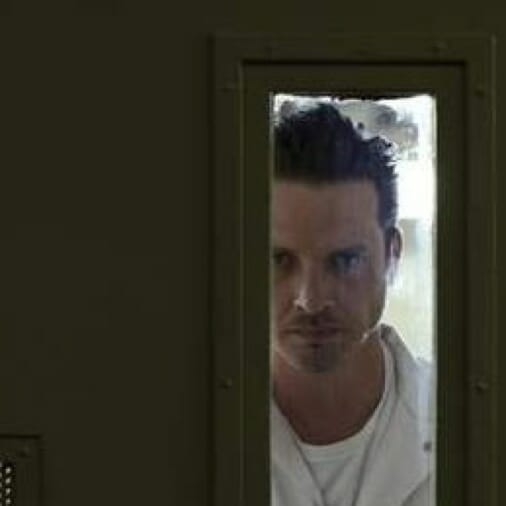
There’s a scene toward the end of the two-hour premiere of Sundance Channel’s Rectify in which newly released inmate Daniel Holden (Aden Young) attempts to explain his mindset after having spent 19 years on death row. “Now that I’m here in this world where everything’s marked by hours or dates or events, I find myself in a state of constant anticipation,” he says. “What it is I’m anticipating I’m not always sure, nor is it necessarily a pleasant feeling.” It’s a statement that confirms what viewers have already figured out. To paraphrase Forrest Gump, “weird is as weird does.” And two decades in a windowless 6×10 cell does nothing to prepare a man for unexpected freedom and common, everyday experiences.
The show opens as Daniel is about to be released. As he changes from his prison jumpsuit into new clothes, he is visibly taken aback by the gracious treatment he receives by a guard. It is a small scene with little dialogue, but powerful in how much it tells us. A free man is a respected man. Daniel’s family arrives to a media circus outside the prison walls as everyone awaits his release. Because of new DNA results, Daniel is cleared of killing his girlfriend back when he was 18 years old. But a state senator who was the original prosecutor does a little grandstanding, wanting the world to know that Daniel remains a suspect and that he originally confessed to the murder. The senator begins to push for a new investigation.
Daniel’s sister Amantha is wonderfully played by Abigail Spencer as both the voice of outrage and as the most adamant protector of Daniel, as opposed to his mother Janet (J. Smith-Cameron) who, while obviously happy to have her son home, has a way of avoiding conversations about his conviction and incarceration that implies she may have had doubts about his innocence. Two of the most interesting characters are Ted Jr. (Clayne Crawford), Janet’s stepson, and his wife Tawney (Adelaide Clemens). It may be because Ted Jr. sees Daniel as a threat to his place in the family tire business, but Ted Jr. believes Daniel is guilty, and odd, calling him Starman behind his back. But it is Ted Jr. who’s odd, creepily ogling his own wife while she undresses, and covertly slipping “dirty” magazines to Daniel. Conversely, Tawney engages Daniel in supportive conversation that telegraphs a future connection.
Created by one-time Little Rock resident Ray McKinnon, Rectify borrows from real-life incidents, most obvious being the case surrounding The West Memphis Three, a story chronicled in a trio of documentaries: Paradise Lost: The Child Murders At Robin Hood Hills (1996), Paradise Lost 2: Revelations (2000) and Paradise Lost 3: Purgatory (2011). Three teenagers were tried and convicted of mutilating and murdering three young boys and spent 18 years behind bars before being released because of new DNA evidence. One of the three, Damien Echols, was on Death Row when released. Interestingly, Echols wrote an article in The Huffington Post giving his impressions of Rectify after having seen it before the series aired. He readily admits the connection, calling the show “very realistic,” giving us another reason to watch.
In the same manner that Echols was labeled “strange” during his trial, Daniel also doesn’t fit in. His speech pattern of articulating sentences along with non-acknowledging facial expressions tends to make people uncomfortable. There are several scenes of Daniel, with a childlike wonder, solemnly viewing his surroundings—from a car, in a convenience store, at a golf course, or watching Dazed And Confused on DVD. No one knows what to expect because he doesn’t know himself.
Through flashbacks we get glimpses of Daniel’s prison life. He befriends a cell neighbor who has been convicted of killing a three-year-old girl and is irritated by Daniel’s mantras and meditations. “I can’t do time the way you do,” he says. “I don’t do time,” replies Daniel. “See, that’s what I’m talking about,” says his neighbor. “I can’t do time by not doin’ time the way you do time. All that cross-legged shit just gets me antsy!” But their conversations are downright holy compared to what he has to hear from the sick, twisted psycho in the cell on the other side.
Meanwhile, two men who were somehow involved with the original murder scene secretly meet up, both saying they didn’t kill the girl with one ending the conversation with “But what is the truth?” Then, after his companion leaves, he inexplicably kills himself with a pistol shot to the head. The fact that the entire season takes place over seven days should make for some compelling TV, and for pure name value, it is executive-produced by the same folks from Breaking Bad, being the first show totally produced by the Sundance Channel. McKinnon’s face is mostly known through his performances in films such as The Blind Side and That Evening Sun and television series like Deadwood and Sons of Anarchy. Few, however, know that the actor received an Oscar in 2002 as co-producer of the short film The Accountant, which he also wrote and directed.
The premiere ends as Amantha unintentionally hears Daniel though his bedroom door as he relieves some sexual tension with the magazine Ted Jr. gave him, a scene strangely representative, and maybe reminiscent, of their youthful, sibling innocence 20 years earlier.
The show is smart, but not in a self-superior way. The dialogue stands well on its own, but the subtext sweetens the meal. Daniel’s unsettling feeling of anticipation is a mirror, of sorts, to how Rectify moves from scene to scene. While it may not always be a pleasant feeling, so far it is most certainly entertaining.